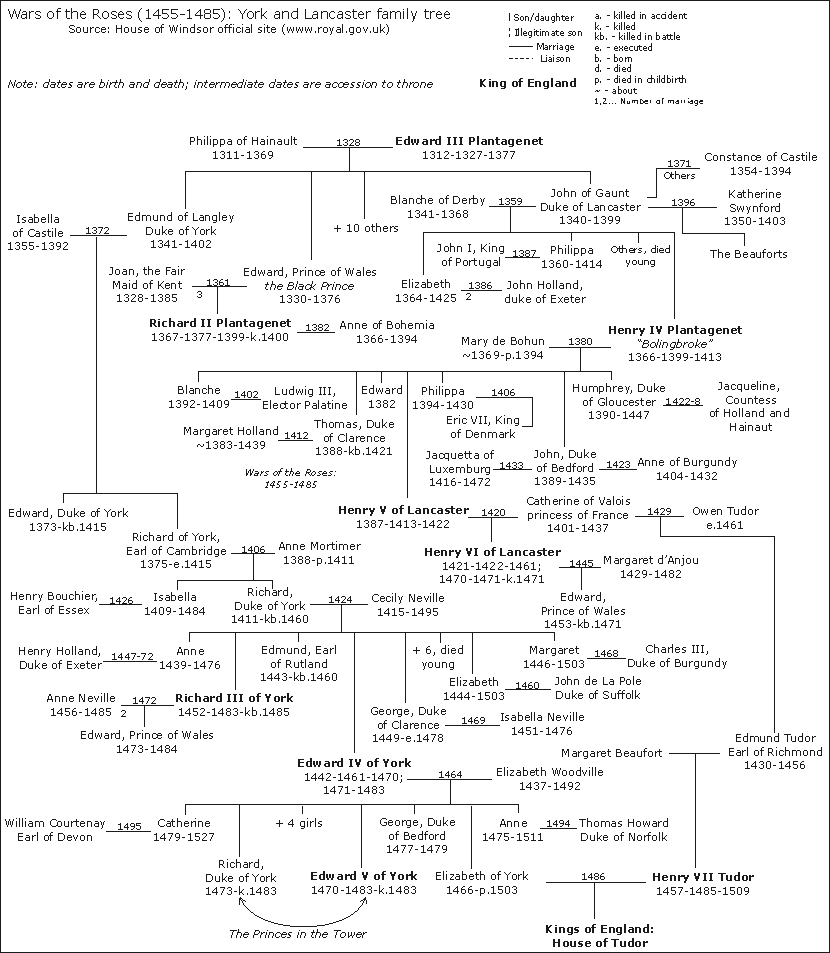Shakespeare's history plays are generally split among two tetrologies, the first comprising of Henry VI, Part 1; Henry VI, Part 2; Henry VI, Part 3; and Richard III and the second being the plays Richard II; Henry IV, Part 1; Henry IV, Part 2; and Henry V, though the events detailed in the second tetrology happened chronologically before the events of the first. And it all comes down to wars and kings.
To understand fully the background of these plays, one needs to understand English history, specifically the events of the Hundred Years' War and the War of the Roses. I have studied this part of English history a bit, so let me attempt to give a little of the historical background.
Let's start with Richard II, who was king from 1367 - 1400. (To remember the different Richards in English history, just remember your Clint Eastwood: The Good, the Bad, and the Ugly. Richard I = the Good. He was Richard the Lionhearted who led the crusades, you'll see him at the end of Robin Hood coming home. Richard II= the Bad, generally considered a bad king, did not govern very well. And Richard III is the Ugly, he's the hunchback, evil king who killed his brothers and his nephews to get the throne.)
The three Richards, Hollywood style.
Because Richard II wasn't a very good king, Henry Bolingbroke overthrew him and was crowned Henry IV. These events are told in the play Richard II. Shakespeare then writes two plays about Henry IV, dealing with the uprisings and wars that he is dealing with. We are also introduced to young Prince Hal, who, rather than being a good prince and learning of his father how to rule a kingdom, spends his time in the tavern at Eastcheep, drinking and carousing with the fat John Falstaff and friends. This only adds to the frustrations of his father, who is uncertain what will happen after his death.
Henry V (1387 - 1422) became king at 26 and inherited a war with France. Being convinced that he could lay a legal claim to the throne of France, he agreed to invade. During this play, we see him grow as a man and as a king, defeating the French and being named heir to the French throne, temporarily ending the Hundred Years' War.
Henry V died young, though, only ruling for 9 years, and his son Henry VI became king at 9 months old. Being so young, there was a Regent appointed to rule in his stead, and even when he came of age he was very dependent on his counselors and advisors and was never a very strong king.
During his reign we have the War of the Roses, a civil war between two rival houses: York and Lancaster. Henry VI was deposed for 9 years, as his cousin Edward IV took the throne. Henry VI regained the throne in 1470, but lost it again the next year, and was locked up in the Tower of London by Edward IV.
Edward IV had two brothers, George, Duke of Clarence, and Richard, Duke of Gloucester (later to become Richard III). Richard was a weasel, to put it nicely, and in the play named for him we see how he pitted his brothers against each other, killed George, locked up and killed Edward's sons, then stepped in when Edward died and became king.
He only ruled for 2 years from 1483 -1485, when at the Battle of Bosworth Field he was defeated by yet another guy named Henry, Henry Tudor. Henry Tudor was descended from Owen Tudor, the second husband of Henry V's queen Catherine, and he was married to Elizabeth of York, so he was neither a York nor a Lancaster, but had close familial ties to both families. When he ascended the throne in 1485, he put an end to the War of the Roses and established the Tudor Dynasty.
And that is where Shakespeare's history plays end, but this history becomes all the more interesting when you continue the generations.
Henry VII (Henry Tudor) had a son also named Henry, who became Henry VIII (yes, that Henry the Eighth, the one with the wives.) After all of the wife-killing, he was succeeded by Edward VI, but he was only 9 and ruled for 6 years, so his entire reign was ruled by a Regent. After a brief four month reign, Henry VIII's daughter Mary I was succeeded by his other daughter Elizabeth -- Elizabeth the First, who was queen when Shakespeare was writing his plays.
When you consider that, it's no wonder that Henry Tudor is portrayed as the good guy, where Richard III is a villain. Henry was the current monarch's grandfather, and you gotta make sure he's the good guy.
Does this family tree help?

